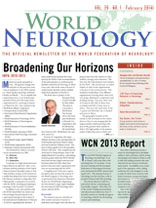By S. M. Katrak, MD, DM, FRCPE
As president of the IndianAcademy of Neurology (IAN) (2004-2005), I was disturbed by the fact that the WFN sponsored CME program had a weak presence in Asia, particularly India. This stimulated me to take over the reins as coordinator for this program in India. As per the advice and guidelines provided by Ted Munsat, I initially started the program in Mumbai. The first CME was held on July 17, 2005, on the topic of multiple sclerosis. From the feedback given by the postgraduate students, it was evident that they enjoyed the CME and found it to be unique and useful.
Considering the success of the program in Mumbai, I decided to “export” the program to other centers in India. I have received enthusiastic support from my colleagues in nine centers all over India: R. S. Wadia (Pune); C. S. Meshram (Nagpur); S. Prabhakar (Chandigarh); J. S. Kathpal (Indore); S. K. Jabeen/Subhash Kaul (Hyderabad); Mutharasu (Chennai); P. C. Gilvaz (Thissur); Birinder Paul/Gagandeep Singh (Ludhiana) and P. S. Gorthi (New Delhi). I would like to thank them for their support in making this program a success in India.
In all these centers, the postgraduates, young and senior neurologists and internists attend these CMEs depending on the topic of discussion. Usually the postgraduates take up each chapter of the continuum highlighting the “take-home” messages. They are usually coupled with a consultant who highlights the salient points and gives the Indian perspective because of the geographical differences in the pattern of neurological diseases.
It is difficult coordinating nine centers in India, but gentle reminders are sent to each coordinator at three- and six-month intervals about their “backlogs.” What really works is a message that we owe the WFN and AAN a debt of gratitude for the gift of these issues of Continuum. Filling out the evaluations forms is just a small way of showing our appreciation. We have been able to get 659 evaluation forms for the year 2012 and 823 for the year 2013.
For the last two years, I got accreditation from the Maharashtra Medical Council (MMC), and they give two credit hours to every participant. This is an added incentive to attend at least in Mumbai and the other two centers in the state of Maharahtra (Pune and Nagpur).
No program can be sustained without some financial support. I was fortunate to get a generous grant from the Australian Association of Neurologists for a sum of $5,000 (Australia) in August 2005 and again in July 2006. We have used these funds frugally to send the evaluation forms to the U.K. and to courier the journals to the various centers in India. The balance funds are now low and soon we may need more funds.
We also are fortunate to get an unconditional educational grant from Intas Pharma, which has supported these CME session in many centers across India — particularly Mumbai. On behalf of the IAN, I would like to thank them for promoting neuro-education in India. I also would like to thank Satish V. Khadilkar who shares the responsibility of coordinator with me in Mumbai with the view of taking over as coordinator for India in the near future.
Katrak is the national coordinator of WFN CME program in India.
